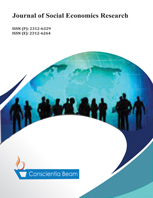Fertility, Education, Labor Force Outcomes, and Cultural Acculturation of Immigrants
DOI:
https://doi.org/10.18488/journal.35.2021.81.12.23Abstract
Previous studies show that there are cultural factors associated with economic outcomes such as employment and labor force participation and non-economic outcomes such as education and fertility. Using immigration as a semi-natural experiment and using the Current Population Survey (1994-2020), we reexamine the link between labor force outcomes, fertility, and education of immigrants and their home country respective characteristics. We documented that an additional year of schooling in the home country is associated with a 0.45 and 0.24 years increase in education of first and second generation females, respectively. Moreover, a 1 percent higher female labor force participation in the home country is associated with a 0.26 and 0.16 percent increase in labor force participation of first and second generation females, respectively. Since the female labor force participation, education, and fertility are considered to contain cultural components, we interpret the results as intergenerational transmission of culture. However, the links are limited for second generations suggesting some cultural integration and acculturation to the new environment. We discuss the policy implications of the results.

